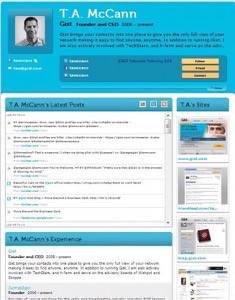Gist.com is a database of dynamic, information-rich user profiles that can be accessed via the Web or inside your email or other communication-management tool, or on your mobile device.

The database is populated with the people who have signed up for Gist’s public beta and their contacts. There are 100 million profiles of people and companies behind Gist’s wall, collected over about a year. Now, Gist wants users to “claim” their profiles by updating their own data (and potentially making some information public).
Crowdsourcing your social network
You may have encountered sites like Intelius, which built profiles for users by scraping publicly available data they’ve submitted elsewhere, slotting it into a directory that users have no control over, and saving it forever. Gist doesn’t do this exactly, but it gets your name from someone in your social graph, connects it to your social media profiles and slots in your recent blog posts. The “vast majority” of the 100 million people in Gist’s directory don’t know they have Gist profiles, CEO and founder T.A. McCann said.
Example of a Gist public profile.

But unlike Intelius, your profile is only visible to Gist users, and to some degree, you can take control of it. Gist is encouraging users to “claim” their profiles by registering, picking a URL for your profile and deciding what information to make public. The resulting profile is where Gist most resembles LinkedIn and will be indexable by search engines and visible to anyone with the address, similar to Google Profiles.
Here’s the rub: You can control what you make public, but Gist users will still see a slightly different profile for you, which they can update with your private blog, personal Flickr and even excerpts from your recent email conversations. Gist uses this user-submitted information to “crowd source” its database, which helps ensure that information stays up to date.
Google Reader meets your Rolodex
Gist is useful for professionals such as marketers or journalists who have to manage a big network of contacts. But it’s more than a database of information about people with links to their social media profiles. Gist also has a space for you to tag a contact, write notes about her, shows your contacts in common from various social sites and display her recent blog posts or Twitter updates.
Example of a profile you would see after you login to your account at Gist.com.

Gist will also assign a level of “importance” for your contacts, editable by you, which it factors into a Facebook-esque “News Feed.” It’s a consolidated inbox, McCann said. We called it a personal relationship manager.
Gist is a powerful, usable alternative to competitor LinkedIn, the business-oriented social network which has been criticized as stale, hostile to developers and fumbling new features (see our post, “Why Does LinkedIn Keep Doing Things That Don’t Make Sense?”).
A platform and a plug-in
You can integrate Gist into your existing workflow by installing a plugin for Gmail, Outlook, Salesforce, Lotus Notes or the iPhone or Android app. It’s also available as a Google Apps gadget and an email digest. McCann said a robust application programming interface, or API, is already in priavate use and will eventually become public, but declined to give details.
How Gist works in Gmail.
Gist is a strong competitor not only to LinkedIn, but also to apps like Rapportive, a browser add-on that displays user profiles in Gmail and expensive databases of people and contact information like Vocus. Gist raised $4 million in July on top of $6.75 million last year. McCann plans to monetize by providing premium services to users who want to see information from paid databases like Hoovers and enterprises that want to integrate Gist into their own software.
So is it a LinkedIn killer?
The crowdsourcing element is a little unnerving. Gist lets anyone submit information about you, and anyone you’ve emailed can upload the subject lines of your emails and who you’ve cc’ed (note: Gist does not make content from your emails public). It’s all information that you’ve made public in some way or another, but it’s a little scary in the aggregate.
Gist is a formidable LinkedIn challenger, and perhaps it deserves to win. We love the library of plugins and extensive functionality. But Gist’s automated and crowd-sourced database is a little too slick – if only because it reminds you that information you share on the Web could end up anywhere.
We’d love to hear what you think about Gist. Have you claimed your profile?
















